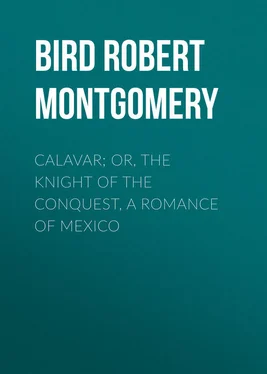Robert Bird - Calavar; or, The Knight of The Conquest, A Romance of Mexico
Здесь есть возможность читать онлайн «Robert Bird - Calavar; or, The Knight of The Conquest, A Romance of Mexico» — ознакомительный отрывок электронной книги совершенно бесплатно, а после прочтения отрывка купить полную версию. В некоторых случаях можно слушать аудио, скачать через торрент в формате fb2 и присутствует краткое содержание. Жанр: foreign_antique, foreign_prose, Историческая проза, на английском языке. Описание произведения, (предисловие) а так же отзывы посетителей доступны на портале библиотеки ЛибКат.
- Название:Calavar; or, The Knight of The Conquest, A Romance of Mexico
- Автор:
- Жанр:
- Год:неизвестен
- ISBN:нет данных
- Рейтинг книги:5 / 5. Голосов: 1
-
Избранное:Добавить в избранное
- Отзывы:
-
Ваша оценка:
- 100
- 1
- 2
- 3
- 4
- 5
Calavar; or, The Knight of The Conquest, A Romance of Mexico: краткое содержание, описание и аннотация
Предлагаем к чтению аннотацию, описание, краткое содержание или предисловие (зависит от того, что написал сам автор книги «Calavar; or, The Knight of The Conquest, A Romance of Mexico»). Если вы не нашли необходимую информацию о книге — напишите в комментариях, мы постараемся отыскать её.
Calavar; or, The Knight of The Conquest, A Romance of Mexico — читать онлайн ознакомительный отрывок
Ниже представлен текст книги, разбитый по страницам. Система сохранения места последней прочитанной страницы, позволяет с удобством читать онлайн бесплатно книгу «Calavar; or, The Knight of The Conquest, A Romance of Mexico», без необходимости каждый раз заново искать на чём Вы остановились. Поставьте закладку, и сможете в любой момент перейти на страницу, на которой закончили чтение.
Интервал:
Закладка:
CHAPTER VIII
Two or three hours before sunset, the sleepers were roused to renew their march. Horses were saddled and armour buckled, and Don Amador de Leste mounted his steed with great satisfaction at the thought of still further diminishing the distance that separated him from his knight. As the train began to ford the rivulet, he turned round and beckoned to Abdoul, who, with Jacinto, had taken the station assigned them behind the musketeers.
"Sidi Abdalla," said he, "I have thought it a great shame that thy weary boy should trudge over these sands afoot, when such men as myself and my people are resting our lazy limbs on horseback. I have therefore given order to my soldier, Lazaro, to take the youth behind him; whereby much discomfort and suffering may be avoided."
"My lord will scorn the thanks of the poor Morisco," said Abdoul, humbly. "Sleep, and the food which it pleased my noble lord to give to the boy, have so refreshed his strength and his spirits, that now, in the pleasant evening air, he will journey without pain, as he has often, of yore, in the deserts of Barbary. And let not my lord be displeased to know, that Jacinto will be of better heart at the side of his father, than on the saddle of my lord's servant."
"If it be as thou sayest," said the cavalier, "I am content. Heaven forbid I should take him from thee, but for his good; which, doubtless, thou must know better how to compass than myself. Yet if he should at any time grow weary, make me acquainted with it, and Lazaro shall be still prepared to give him relief."
The Moor bent his head to the ground, and fell back; while Amador, followed by his attendants and the secretary, rode to the head of the train.
No occurrence of moment interrupted the monotony of the journey, until a thunderstorm, accompanied by rain, drove them for shelter into a forest, where their march was interrupted for a time. But with a capriciousness equal to the fury with which they had gathered, the clouds parted and vanished in the sunbeams; the earth was gladdened; the trees shook the liquid treasure from their leaves; a breeze came from the distant surges; and, resuming their path, the train and cavalcade went on their way rejoicing.
As they advanced, and as the day declined, the country assumed a more agreeable aspect; the woods were thicker and more luxuriant; the mountains approached nearer to the sea, and the streams gambolled among piles of rocks, instead of creeping sluggishly through the sands; the flowers were more abundant, and the birds, resuming their songs, prepared their vespers for the sinking luminary. At last he set: the curlew wheeled his last flight; the plover sent his last whistle, from the air; and the stars, stealing out from the dusky arch, shed their celestial lustre over the path of the travellers. With these lamps of heaven, were also lit the torches of the cucujos, – those phosphorescent beetles, with which Don Amador had been made acquainted in the islands. But he did not the less admire the splendour of the spectacle, when he saw these resplendent insects glistening among the trees, or flashing by him like little meteors. The moon rose from the sea; and as her mellow radiance streamed over the tree tops, or sheeted itself on the sands, and as a thousand delicious scents came to the nostrils of the soldier, he thought he had never before, not even when watching the same planet in the calm bosom of the Levantine sea, looked upon a scene of more beautiful repose. The commander of the squadron had not, since the affair of the dinner, thought fit, frequently, to trouble Don Amador with his presence; but by the murmurs of satisfaction and curiosity which were breathed about him, the cavalier knew he was approaching the Indian city Zempoala. The party issued from the wood upon what seemed a fair waving plain, dotted, in certain places, with clumps of trees, and doubtless, in other spots, enriched with plantations of maize and bananas. In the distance, from a dark and shadowy mass, which might have been a lofty grove or a low hillock, and whose gloom was alike broken by the glare of insects and the flash of many flambeaux, arose three lofty towers, square and white, and glittering in the moonbeams as if covered over with plates of silver.
"Zempoala!" whispered an hundred voices, as these gleaming fabrics came fairly into view. The languid horseman raised himself on his saddle; the foot-soldier strode onwards with a firmer and quicker step; and at each moment, as the three towers reflected the moonbeams with increasing brilliancy, more torches flickered and more structures were seen shining among the trees; and it was evident to Don Amador that he was approaching a city or town of no little magnitude.
The secretary had pressed to his side, and overhearing his exclamations of surprise, took the liberty of addressing him.
"Señor," he cried, "they say this pagan city is bigger and lovelier than Seville. I have often before heard of the Silver Towers; for truly, when the men of Cortes first saw them, they thought they were built of blocks of plate, and rode forward to hack away some samples with their swords; whereupon, to their great shame and disappointment, they discovered the brilliance to be owing to a certain white and polished plaster, with which these barbarians have the art to beautify their temples."
"Are these then the sanctuaries of the fiend?" said the neophyte, raising himself, and surveying the structures with a frown of infinite hostility: "It drives me to little esteem, to know that the señor Narvaez and his companions should rest in sight of these accursed places, without hurling them to the dust."
"They are no longer the houses of devils," said Lorenzo: "Cortes, the great rebel, tore the idols from their altars, and putting an image of Our Blessed Lady in their place, consecrated them forthwith to the service of God."
"I hear nothing of Cortes, that does not convince me he is a truly noble and faithful cavalier," said Amador, with emphasis.
"There can be no doubt of that," said the secretary; "nevertheless, if I may presume to advise your favour, I would beseech you not to mention the name of Cortes among these men of Narvaez; or at least, not with the respect which you may think his due."
"Dost thou know," said Amador, addressing Fabueno so sternly, as to cause him instantly to repent his presumption: "dost thou know, that what thou art saying is of so base and boorish a spirit, that, if it be the true prompting of thy heart, thou art utterly unworthy to take upon thee the arms, as thou art wholly incapable of winning the fame, of a soldier? Know thou, for it is good thou shouldst be told, that all hypocrisy is the offspring of cowardice, and is therefore impossible to be practised by a brave man: know also, that when thou art deceiving man, thou art lying to God, which is an impiety not to be thought of by an honest man: and know, in conclusion, that when thou art called upon for thy opinion, if thou givest not that which is in thy heart, thou art guilty of that hypocrisy which is cowardice, and that deceit which is perjury."
"I beg your worship's pardon," said Lorenzo, abashed and confounded, and somewhat bewildered by the chivalrous and fantastic system of honour disclosed in the reproof of the cavalier. "I meant only to let your favour know, that there could be no travelling beyond this Indian city, without the good will of Narvaez and his officers, which might not be gained by commending their enemy. And moreover, señor, if you will suffer me to justify myself, – while I confess it would be both cowardly and impious, as your worship says, to conceal or alter a sentiment, when it is called for, yet was I thinking it could be in no wise dishonourable to retain in our own mind opinions not called for, particularly when they might be disagreeable to those upon whom they were thus, as I may say, forced."
Читать дальшеИнтервал:
Закладка:
Похожие книги на «Calavar; or, The Knight of The Conquest, A Romance of Mexico»
Представляем Вашему вниманию похожие книги на «Calavar; or, The Knight of The Conquest, A Romance of Mexico» списком для выбора. Мы отобрали схожую по названию и смыслу литературу в надежде предоставить читателям больше вариантов отыскать новые, интересные, ещё непрочитанные произведения.
Обсуждение, отзывы о книге «Calavar; or, The Knight of The Conquest, A Romance of Mexico» и просто собственные мнения читателей. Оставьте ваши комментарии, напишите, что Вы думаете о произведении, его смысле или главных героях. Укажите что конкретно понравилось, а что нет, и почему Вы так считаете.












